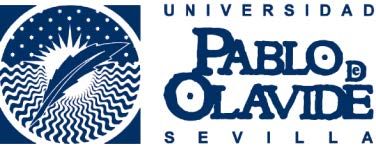
The rector of the UPO, Vicente Guzmán Fluja, and the president of the Association of Neurodegenerative Diseases with Brain Iron Accumulation, Antonio López Galán, signed a collaboration agreement this morning
THE ENACH ASSOCIATION IS FINANCING A PIONEERING RESEARCH LINE AT THE UPO TO DEVELOP PERSONALISED THERAPIES
The team led by Professor José Antonio Sánchez Alcázar will study the development of new alternative treatments to beta-propeller protein-associated neurodegeneration (BPAN), one of the 11 subtypes of the rare disease called NBIA (Neurodegeneration with Brain Iron Accumulation).
The rector of the Pablo de Olavide University, Vicente Guzmán Fluja, and the president of the ENACH Association (Association of Neurodegenerative Diseases with Brain Iron Accumulation), Antonio López Galán, signed a collaboration agreement this morning to contribute to the development of new alternative treatments to beta-propeller protein-associated neurodegeneration (BPAN), one of the 11 subtypes of a rare disease called NBIA that mostly affects children during their first decade of life.
This new line of research constitutes a pioneering initiative within the BrainCure Project. This project is promoted by the ENACH Association and developed by the science team led by the UPO professor José Antonio Sánchez Alcázar, from the Department of Physiology, Anatomy and Cell Biology, a researcher of international repute in the quest for rare disease therapies.
After signing the agreement, Vicente Guzmán stressed that "as a public service institution, the University has to work to improve people's lives and to reach domains that have not been addressed by other initiatives". He also stated that "this agreement illustrates how UPO is committed to truly important issues in society. The University Pablo de Olavide and its researchers will be joining, to the extent possible, the fight against these diseases”.
For his part, Antonio Lopez thanked the University Pablo de Olavide for endorsing an agreement that addresses "a very lonely" field. He also stressed the importance of the associative movement, whose "efforts and fighting spirit" benefitted the whole of society. In addition, the researcher José Antonio Sánchez Alcázar highlighted the social and promising nature of this project "as it brings hope to sufferers of progressive diseases for which no treatments exist, as well as to their families. This movement towards change, to make possible what seems impossible, also encourages competition."
The BrainCure Project
ENACH is a non-profit association that aims at promoting research directed towards seeking cures or chronification for patients within this group of neurodegenerative pathologies. This group of neurodegenerative disorders, which affects approximately 60 people in Spain and around 15,000 patients worldwide, is characterised by a dysfunctional central nervous system and the accumulation of iron in certain areas of the brain, which causes patients’ progressive disability.
Thus, the BrainCure Project intends to look for drugs already existing in the market that, in different combinations and doses, could be a therapeutic option for ENACH patients. As Antonio López, president of the ENACH Association, explains, "the point is to find existing medicines to treat our children today, not tomorrow."
Since the BrainCure Project was launched in 2014, the team of Professor Sánchez Alcázar, who works at the CABD (Andalusian Centre for Development Biology), has made great strides, such as finding a method that allows to determine, on an individual basis, the most effective combination of drugs to alleviate the severe effects of Neurodegeneration with Brain Iron Accumulation (NBIA).
In this way, the results obtained in the laboratory with cell models of the patients themselves are being subsequently transferred to the clinic, obtaining very promising results in the case of the ENACH subtype called PKAN (the most prevalent subtype). This has led to applying the same methodology to the other ENACH subtypes with encouraging results in the laboratory.
"13 drugs have been identified for the PKAN subtype, 5 patients are being treated with excellent results and 3 are being incorporated with an improved drug combination. Regarding the PLAN subtype, 15
medications have been identified and one patient has just begun treatment. We will now start with the BPAN subtype and we wish to include MPAN as a possible line of research", explains Antonio López.
Dr. Sánchez Alcázar’s team proposes an ambitious vision adapted to the new concept of personalised medicine. This science team proposes to evaluate the therapeutic effectiveness of the different treatments of fibroblasts derived from patients and neuronal cells generated by direct reprogramming. Dr. Sánchez Alcázar explains that to achieve this goal, "we studied the effects of these treatments on the physiopathological alterations present in fibroblasts and neuronal cells derived from patients". In this way, they are evaluating the effects of the different drugs and in vitro doses on patients’ own tissues allowing them to observe results on an individual basis thus lowering the risk of adverse effects for patients.
Once BrainCure identifies which drug combination and doses work for each patient’s fibroblasts, the results are presented to the patient’s neurologist and he/she then decides whether to apply the treatment.
Thus, thanks to this agreement whereby the ENACH Association will donate 44,000 euros, the Sánchez Alcázar’s research group will characterise the physiopathogenic mechanisms in the fibroblasts of betapropeller protein-associated neurodegeneration (BPAN) patients. In addition, a further line of research will focus on assessing the efficacy and orphan indication of the agents that modulate autophagy/mitophagy and mitochondrial biogenesis.
Little by little, the BrainCure project is growing and receiving support both inside and outside Spain. Recently, ENACH’s sister Association in France, AIDNAI, signed a collaboration and support agreement for this project. Other international organisations will also be joining in the coming weeks.
Contact:
Antonio López Galán. Presidente de ENACH Asociación
Email: enachasociacion@hotmail.com
Tel.: +34 619405091
José Antonio Sánchez Alcázar. Professor in the Department of Physiology, Anatomy and Cell Biology.
Email: jasanalc@upo.es
